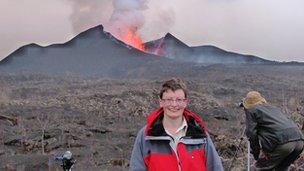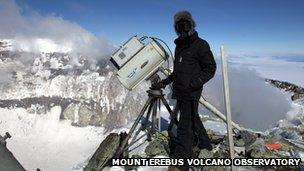What is it like to be a volcanologist?
- Published
Lorraine Field on the extraordinary experience of looking into the world's largest lava lake
Volcanologists are among science's most adventurous researchers, travelling to some of the planet's more remote places to try to better understand one of nature's most powerful and destructive forces - the volcano.
When Lorraine Field stood and watched a bright red fire fountain shooting violently out from the Nyamuragira volcano, in the Democratic Republic of Congo, she said the noise and the heat of the eruption were "like an assault on her senses".
To see the eruption she had flown to Rwanda, before driving 180km (111 miles) to the politically unstable <link> <caption>DR Congo</caption> <url href="http://www.bbc.co.uk/news/world-africa-13283212" platform="highweb"/> </link> , and then trekking 8km (five miles) through a hot and humid rainforest.
Her life now couldn't be more different from a decade before, when she was working in a desk-bound job in England.
"I used to be contracts manager for a mobile telecoms infrastructure company," she explained.
"About 10 years ago I started studying geology with the Open University. I was actually made redundant, so I decided that this was an opportunity and went back to university to study full time."
What was originally intended to be a career break developed into her dream career. After getting a bachelors degree in geology from Durham University, she recently completed a PhD at Bristol University, aged 47.
She now works for the British Geological Survey.
"Studying volcanoes has completely changed my life. I've got a better understanding of the Earth that we live on for a start," she said.
"I can't wait to get up in the morning and come in to work now, whereas 10 years ago Monday morning had that Monday morning feeling - I didn't want to go in to work.
"I get excited about everything that I do now - it has completely changed my life."
The trip to DR Congo was intended to be a holiday to celebrate finishing her PhD, and typified why she loves being a volcanologist out in the field.
Dangers
"Normally when you see geology it has happened over hundreds, thousands and millions of years, but this was geology in action; this was live, this was rocks being born right in front of us, so that was absolutely incredible. You don't often get a chance to experience that."

Dr Field worked in mobile telecoms before changing careers ten years ago
Dr Field says she was inspired to become a volcanologist after becoming "fascinated with the internal workings of a volcano and how a single crystal can give you an insight into an entire volcanic system".
A passion to see volcanoes up close is not without its dangers, as was proved by an incident in 1993 when six volcanologists were killed when a Colombian volcano, called Galeras, erupted.
Dr Field said that volcanologists have a healthy respect for the dangers volcanoes pose because they understand how they work.
Even so, she had her own scrape with an erupting volcano when she travelled to the <link> <caption>Afar region</caption> <url href="http://www.bbc.co.uk/news/world-africa-16620783" platform="highweb"/> </link> of Ethiopia to study the <link> <caption>Erta Ale</caption> <url href="http://news.bbc.co.uk/1/hi/sci/tech/7950845.stm" platform="highweb"/> </link> volcano.
"When we got there it was actually erupting and overflowing which we hadn't expected and we were standing rather too close to the lava and we did have to run out of the way," she said.
But for her, having the opportunity to gain a better understanding of volcanoes by travelling to remote corners of the globe outweighs the risks.
Harsh environment
It's a sense of adventure shared with fellow volcanologist, Dr Clive Oppenheimer of Cambridge University.
He braves the hostile climate in <link> <caption>Antarctica</caption> <url href="http://www.bbc.co.uk/nature/ecozones/Antarctic_ecozone" platform="highweb"/> </link> - where temperatures are typically -30C (-22F) - for one month every year to study the Mount Erebus volcano.
"I've been going to Erebus every year for the last nine years now, and in many ways it's a nuts place to go because it's so far away," he said.
"There are plenty of other volcanoes all around the world that I could go to, but Erebus is very special not just for its activity but you also live in this very harsh environment for a month.
"I think it's the closest I could imagine to being an astronaut and going to Mars or somewhere very exotic. I'd like to go to lo, Jupiter's moon, which has got fantastic volcanoes, but the Antarctic is the next best thing - you have all kinds of space suit gear to cope with the extreme weather."
Dr Oppenheimer analyses the composition of the gases coming out of volcanoes to try to diagnose why some volcanoes erupt explosively, whilst others erupt peacefully and why the same volcanoes sometimes switch very dramatically.

Dr Oppenheimer braves temperatures of -30C to study the Mount Erebus volcano
He said in the UK most people's interest in volcanoes had only really been aroused by the volcanic eruption in Iceland which grounded flights across Europe in May 2011.
"I think everyone needs to maybe not care about volcanoes, but certainly be interested in them," he said.
"Obviously some people are directly threatened by volcanism in many parts of the world, and in the UK we discovered volcanology a bit more recently.
"All the disruption to aviation, it's very much a technological kind of hazard, but I think volcanoes actually affect who we are in the bigger picture."
<italic>Professor Iain Stewart and Kate Humble present </italic> <link> <caption>Volcano Live</caption> <url href="http://www.bbc.co.uk/programmes/p00tmqdr" platform="highweb"/> </link> <italic>, from Kilauea on Hawaii, the world's most active volcano. Starting on BBC Two on Monday 9 July at 20:00 BST. </italic>
- Published5 July 2012
- Published30 May 2012